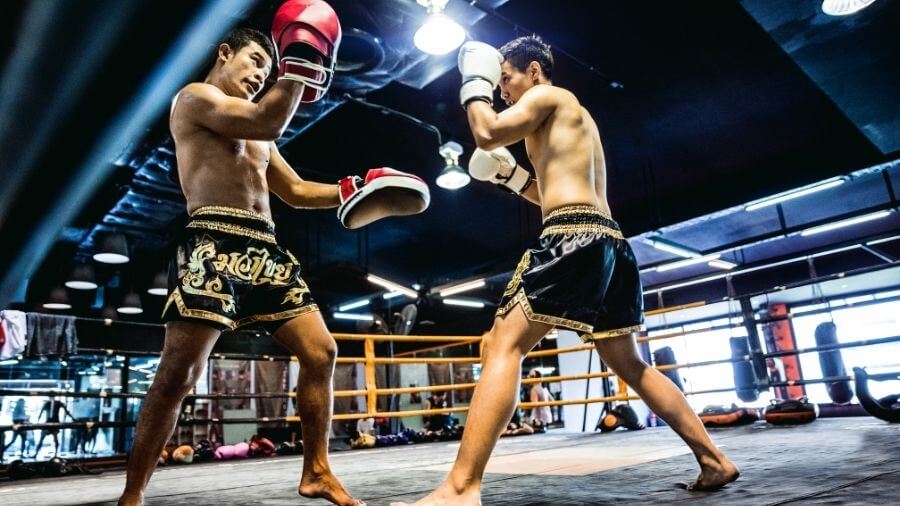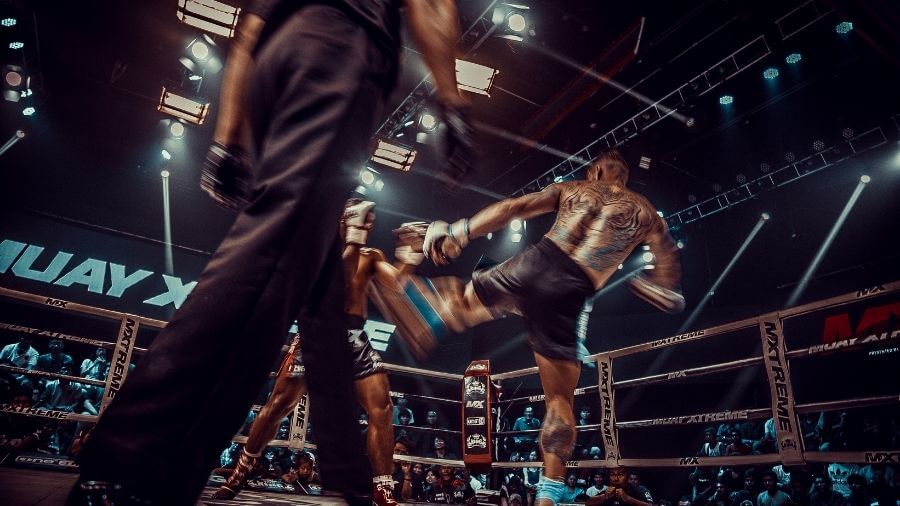Most traditional martial arts are allergic to iron. The tradition has always been to avoid lifting weights for fear of making them slow. There is some truth to that statement when lifting is done wrong.
Muay Thai fighters do lift weights 2-3 times per week, depending on their strengths and weaknesses. However, lifting weights may not be so prevalent in traditional Muay Thai camps.
But Muay Thai fighters do lift weights. Sometimes it’s purely calisthenics, while others will hit the squat rack. But is it bad to lift weights for Muay Thai?
Is It Bad For Muay Thai Fighters To Lift Weights?
It is not bad for Muay Thai fighters to lift weights. However, there is always a caveat. Running a pure Powerlifting or bodybuilding program can be bad for Muay Thai. Remember, the poison is in the dose.
These types of lifting programs are typically high volume focusing on exclusively maximal strength or hypertrophy (muscle growth). The issue with this is the impending fatigue from the high lifting volume. When you have long sessions of bag and pad work and sparring, you need the energy for those sessions.
Discover The Little Known Secrets For Unlocking Devastating KO Power!
Heavy hands are built doing these things...
This means lifting weights needs to compliment Muay Thai, not take away from it. Muay Thai has a much lower maximal strength requirement and instead relies on reactive and explosive strength with the ability to repeat it over rounds.
Therefore, lifting weights isn’t bad for Muay Thai if done to compliment Muay Thai by lifting with lower volumes.
Should Muay Thai Fighters Lift Weights?

Contrary to popular belief, Muay Thai fighters should lift weights. While it might not be widespread in traditional Thai boxing, it is vital for Muay Thai performance. Firstly, lifting weights should emphasize reactive and explosive strength depending on the fighter to enhance the stretch-shortening cycle.
Strikes like double knees and switch kicks require high levels of reactive strength [1]. While this is often developed within Muay Thai by jumping rope and spending time in the ring, supplementing with various extensive and intensive plyometrics like pogos and hurdle hops can develop this quality further.
Explosive strength is power and encompasses the ability to produce force at fast speeds. You can use various jumps, throws, and even Olympic lifts to develop this quality. All of this enhances stretch-shortening cycle ability, which is the ability to go from an eccentric to concentric muscle action rapidly.
It stores and uses elastic energy within the passive elastic structures surrounding our muscles and tendons. It enhances power but is also energy saving, where a well-developed stretch-shortening cycle can halve the energy cost with each foot strike when running [2].
Secondly, lifting weights may lower your risk of injury and increase your training load tolerance to train longer and harder without breaking down [3].
Does Lifting Weights Make You Slower For Muay Thai?

Lifting weights will only make you slower for Muay Thai if you lift heavy with high volume often without touching speed and power exercises or training enough Muay Thai. This thought still prevails because most fighters start lifting with Powerlifting or bodybuilding programs, which will make you slower over time if other aspects of preparation are neglected.
This is because the adaptations to maximal strength and hypertrophy training oppose those of high-velocity strength training.
When a Muay Thai strength training program is well-rounded with Muay Thai as the priority, it will only make you faster and more powerful.
How Often Should Muay Thai Fighters Lift Weights?
Muay Thai fighters should lift weights 2-3 times per week. This depends on your strengths and weaknesses, how often you train Muay Thai, and your competitive level. If you are an amateur Muay Thai fighter or just enjoy the training a few days a week, you can do 3 times per week lifting weights.
I recommend 2-3 times a week out of fight camp for the competitive Muay Thai fighter, depending on your needs. When getting closer to a fight, 1-2 times per week is more than enough.
Do Muay Thai Fighters Do Squats?
Muay Thai fighters do squats to develop lower body strength and power. However, is it not a requirement to squat. There are many other ways to develop the lower body for Muay Thai. For example, deadlifting can be a simple substitute.
Also, trap bar jumps, and you can use other loaded jumps if squatting or deadlifting aggravates any old injuries. Single leg squat variations are also fantastic alternatives for squats.
Are Muay Thai Fighters Strong?

While they may look skinny, make no mistake. Muay Thai fighters are strong. You can see it on display if you’ve ever watched Tiger Muay Thai trial videos of professional Thai boxers throwing fighters around from the clinch.
Remember, strength is task-specific. Just because a Muay Thai fighter can’t squat twice bodyweight doesn’t mean they aren’t strong. Many Thai fighters develop their strength through the sport itself.
However, that doesn’t mean general strength won’t benefit you. Developing a good base of upper and lower body strength will transfer to the ring so you can also ragdoll opponents in the clinch.
Summary
Muay Thai fighters do lift weights to maximize their performance. However, it is often not a part of physical preparation in traditional Muay Thai camps. That doesn’t mean you shouldn’t lift weights! Lifting to compliment Muay Thai will only enhance your performance.
References
1. Turner, A. N. (2009). Strength and conditioning for Muay Thai athletes. Strength & Conditioning Journal, 31(6), 78-92.
2. Lindstedt, S. L., LaStayo, P. C., & Reich, T. E. (2001). When active muscles lengthen: properties and consequences of eccentric contractions. Physiology, 16(6), 256-261.
3. Lauersen, J. B., Bertelsen, D. M., & Andersen, L. B. (2014). The effectiveness of exercise interventions to prevent sports injuries: a systematic review and meta-analysis of randomised controlled trials. British journal of sports medicine, 48(11), 871-877.

